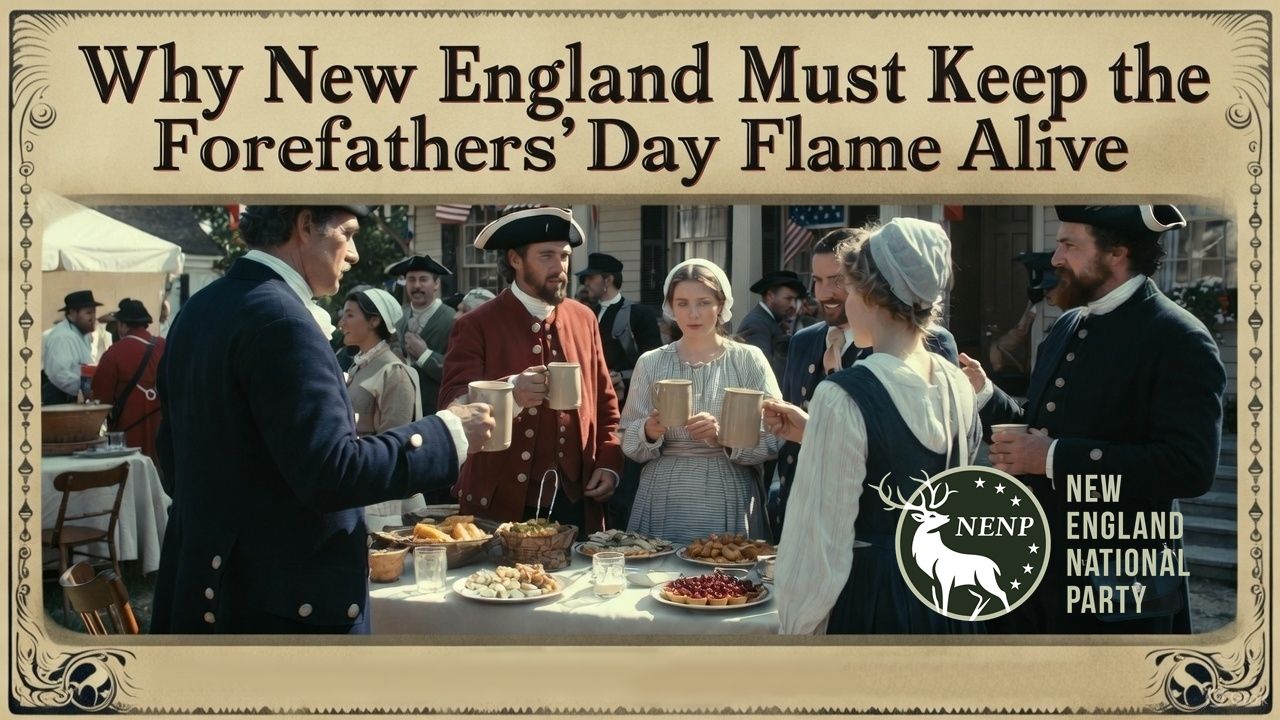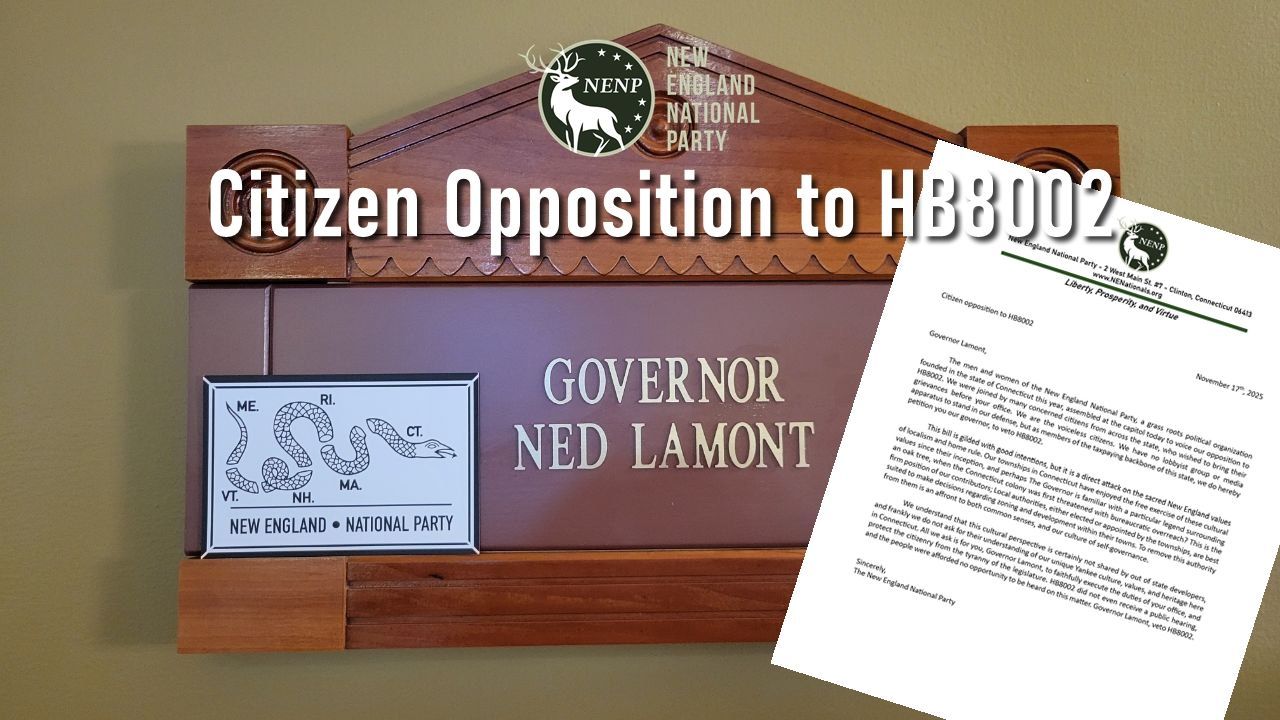Who are we?
News

Why New England Must Keep the Forefathers’ Day Flame Alive Forefathers’ Day—first celebrated in Plymouth, Massachusetts, in 1769—remains one of the oldest continuously observed commemorations in the United States. Originally known as Old Colony Day, the holiday honors the landing of the Pilgrim Fathers at Plymouth in December 1620, and the founding of Plymouth Colony. More than a quaint regional tradition, Forefathers’ Day was born in the tense years before the American Revolution as a deliberate assertion of local identity, resistance to centralized power, and reverence for the values that shaped early New England. Today, those values are no less essential, and the holiday deserves renewed attention in a time when the relationship between citizens and government grows ever more strained. The origins of the holiday are as significant as the event it celebrates. In 1769, a group of young men in Plymouth—Mayflower descendants who formed the Old Colony Club—established a day explicitly “to honor the forefathers.” They chose the adjusted anniversary of the Pilgrims’ landing, taking into account the 1752 switch from the Julian to the Gregorian calendar. That first celebration, held on December 22, 1769, took place at an inn built on the site of the colony’s earliest licensed house. It featured simple New England fare that the founders believed echoed the Pilgrims’ table: Indian whortleberry pudding, succotash, clams, codfish, venison roasted on an early colonial jack, seafowl, eel, apple pie, and cranberry tarts. Early festivities also introduced elements that would become hallmarks of the holiday: dawn marches, the firing of guns or cannon, toasts, orations, and readings praising the courage, faith, and endurance of the Pilgrim settlers. These rituals were never mere antiquarian amusements. The late 1760s were a time of mounting conflict between Massachusetts and the British Parliment. Taxes without representation, the stationing of troops, the suspension of colonial charters, and the erosion of traditional rights deeply unsettled the province. In this climate, the descendants of the Pilgrims looked to their forebears, much like the New England National Party does, not simply as historical figures, but as models of resistance to political and religious oppression. The first Forefathers’ Day celebration was therefore patriotic as well as pious—a reminder that the people of New England had stood against tyranny before, and would stand against it again. In the twenty-first century, a dawn march on a cold December morning might seem like an anachronism, a tradition out of joint with a world of smartphones, streaming services, and cultural homogenization. Yet it is precisely because our world is so uniform and centralized that Forefathers’ Day matters more than ever. The federal government now asserts authority over minute details of daily life: what farmers may plant, what appliances households may own, what treatments individuals must purchase, and even what opinions one may voice without fear of reprisal. It borrows, spends, and surveils on a scale that would have staggered the imagination of the Founders. In many ways, the grievances that animated the Pilgrims (and later the Revolutionaries) resonate again, though expressed through modern institutions rather than royal edicts. No region should feel this more sharply than New England. The character of this part of the country—its accent, architecture, cuisine, literature, and cultural identity—was forged by people who placed conscience above coercion, and local self-government above distant authority. The Mayflower Compact, written before the Pilgrims even stepped ashore, remains a testament to the principle that free people govern themselves through mutual consent. Town-meeting democracy, born in New England’s earliest settlements, embodied a political independence unmatched anywhere else in the colonies. To forget these origins is to allow the region’s distinctive identity, and the virtues that sustained it, to erode. Allowing Forefathers’ Day to fade would mean surrendering one of the last public reminders of that heritage. The modern world pressures every community to conform—to consume the same media, accept the same narratives, and submit to the same centralized systems of social and political control. By celebrating Forefathers’ Day, New Englanders perform an act of cultural preservation as vital as maintaining a historic saltbox house or stone wall. The holiday affirms that courage, faith, self-reliance, and local autonomy are not outdated ideals, but enduring requirements of a free society. More than an act of remembrance, the holiday is also an act of preparation. Each generation must be reminded that power corrupts—and that excessive, centralized power corrupts absolutely. The Pilgrims’ descendants in 1769 understood that commemorating the landing of the Mayflower was not play-acting; it was a moral exercise, a way of rehearsing the virtues that resistance to injustice demands. When modern celebrants gather over traditional foods, read classic addresses by Webster or Adams, or toast the ancient virtues—Faith, Valor, Piety, Justice, Liberty—they are cultivating the same disposition of mind and heart that sustained their ancestors in moments of crisis. New England has long punched above her weight in the American story because her people carried a sharper sense of right and wrong, a deeper respect for learning and faith, and a stubborn attachment to principle. That edge grows dull when its history is forgotten. Forefathers’ Day keeps it sharp. So let Plymouth keep its ancient feast on December 22. Let the Old Colony Club march at dawn. Let the Mayflower Society lay its wreath. Let families serve codfish and Indian pudding, and remember that their forebears once chose liberty, even at the cost of hunger and hardship. In an America where centralized authority continues to expand and dissent again draws censure, the example of the Pilgrims is not quaint—it is urgent. Forefathers’ Day reminds us that free communities survive only when they cherish the spirit that gave them birth. The forefathers are still watching, and it is up to New England to keep their flame alive.

In the shadowed corridors of New England, where the Constitution hangs by a thread and the once-proud states of Maine, Vermont, New Hampshire, Massachusetts, Rhode Island, and Connecticut struggle to remember their own roots, the regional Democrats stand accused of high treason for orchestrating this ‘Great Replacement’. Cloaked in humanitarian rhetoric, its leaders fling open the borders, welcoming hordes of illegal aliens from Haiti, India, South America and other third world nations as unwitting soldiers in a silent cultural war. These “new Americans” are an invading force: marching in, not with rifles but with cultural disruptors—demands for foreign tongues in New England’s schools, bizarre rituals in historic town squares, and expectations that centuries-old traditions bow before imported customs. When Democratic leaders like Rep. Matt Blumenthal (D – CT) called current federal immigration policy “fundamentally cruel and stupid.” or Rep. Ambureen Rana (D – ME) “support bills limiting work with federal immigration authorities.” This betrayal, punishable under ancient colonial laws of treason, aids external enemies by diluting the region’s identity, turning sovereign soil into a patchwork of alien enclaves. These invaders refuse assimilation, eroding local cultures. In the once-homogeneous towns from Maine to Connecticut, Cinco de Mayo replace Fourth of July barbecues while Somali clans enforce tribal justice over local laws, leading to clashes that fracture community bonds. South American cartels, disguised as migrant families, import ‘Day of the Dead’ festivals that overshadow Thanksgiving, and Indian enclaves prioritize Diwali over Christmas, forcing schools to adopt multilingual curricula that confuse young American minds. In New England, 70% of these newcomers reject regional language proficiency tests, instead forming insulated bubbles where their foreign music blares beyond New England’s subtle soundscape, they stir the region’s longstanding homogony into something chaotic. Crimes against New Englanders escalate in this nightmarish narrative, painting a grim picture of unchecked aggression. Foreign street gangs in Lewiston and New Haven pray on unsuspecting New Englanders under the guise of cultural celebration. In the towns of Hartford and Providence, foreign syndicates are masterminds of elaborate theft rings, stripping neighborhoods bare while, criminals, posing as asylum seekers, infiltrate towns from Providence to Bangor, committing violent crimes against the citizenry. These acts transform everyday residents into victims, their cries drowned beneath the invaders’ foreign chants. Yet the New England Democrats persist in their defiance, shielding these forces while undermining Immigration enforcement and local police agencies at every turn. In underground caucuses beneath Boston and New Haven, Democratic party elites like Mayor Michelle Wu and Mayor Justin Elicker promote these sanctuary cities that harbor these criminals, issuing decrees that label border agents and local police as “rogue agencies” who are “breaking the law, causing terror” and “terrorizing citizens.” They champion bills that strip funding from ICE and local law enforcement, celebrating each thwarted deportation as a triumph over “xenophobia.” Even as evidence of cultural erosion and crime waves piles up, Democrats rally with chants of solidarity, portraying the invaders as heroes in a grand reimagining of New England’s destiny. All the while, Republicans sit idly by and let it happen, making them also complicit. This unyielding support from both political parties are a clear act of treason.




